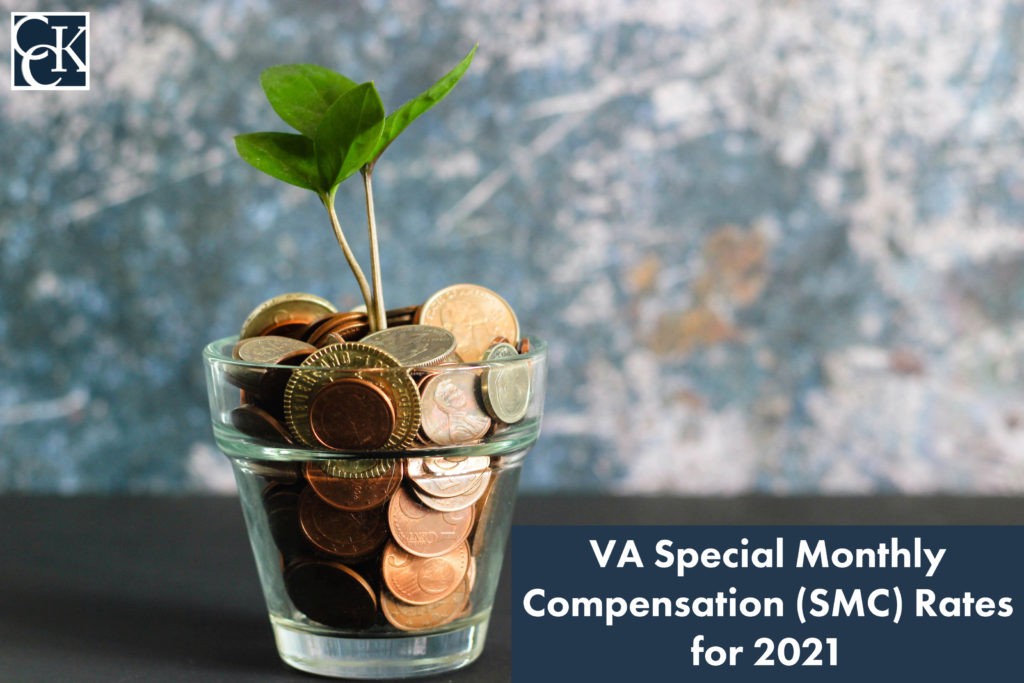VA Special Monthly Compensation (SMC) Rates for 2021

CCK Law: Our Vital Role in Veterans Law
Special Monthly Compensation (SMC) Explained
The Department of Veterans Affairs (VA) pays special monthly compensation (SMC) to qualifying veterans with especially serious disabilities or combinations of disabilities. The idea is that certain disabilities and combinations of disabilities are more debilitating than accounted for by regular disability compensation rates. As such, veterans may receive a higher rate of monthly compensation if VA grants Special Monthly Compensation (SMC).
How to Qualify for Special Monthly Compensation (SMC)
There are several ways to meet the criteria for SMC and the different types of compensation are split into levels:
- Levels L through O list specific conditions and combinations of conditions that qualify a veteran to receive SMC. Level L contains the least severe of these conditions and, therefore, lower special monthly compensation rates. On the other hand, Level O contains more severe conditions and higher special monthly compensation rates.
- Level K provides SMC for veterans who experience a loss or loss of use of a body part(s) or function(s). For example, the loss or loss of use of a hand, foot, or creative organ would all qualify for SMC(k).
- Level R provides compensation for veterans who need daily aid and attendance from another person. It is divided into Level R-1 and Level R-2, with the latter requiring regular aid and attendance from a healthcare professional.
- Level S provides compensation for veterans who cannot leave the house.
- Level T is provided to veterans who suffer from traumatic brain injuries and require regular aid and attendance. SMC Levels R-2 and T provide the same amount of monthly compensation.
Importantly, most special monthly compensation rates are given instead of the standard VA disability compensation rates, except for SMC(k). Level K is given in addition to your standard disability pay. Finally, to be eligible for any level of SMC, the condition you are claiming must be service-connected.

2021 Cost-of-Living Adjustment
In October 2020, the SSA announced that over 70 million Americans who rely on Social Security benefits, VA disability benefits, military retirement, and other government benefits will see a 1.3 percent increase in their monthly compensation. For veterans receiving VA disability benefits, this increase will take effect in December 2020 and be reflected in benefit checks starting on December 31, 2020.
While many veterans were hoping for a higher increase in 2021, this 1.3 percent increase is still significant given earlier projections of no increase at all. There are several reasons for the COLA increase in 2021, including the following:
- COVID-19 has created food and product disruptions, which could result in higher prices in the third quarter.
- COVID-19 fears and the economic impact may subside by the time the CPI-W measurement period begins in July.
- Tariffs and taxes could lift the prices of traded goods, which would be recognized in a higher CPI-W.
Veterans should also see an increase in SMC rates in 2021 due to the increased COLA rate. Importantly, this increase in SMC rates becomes effective on December 1, 2020.
What Are VA’s Special Monthly Compensation (SMC) Rates for 2021?
The table below represents Special Monthly Compensation (SMC) rates for a single veteran without any dependents in 2021:
| SMC Level | Monthly Compensation Amount |
| K | $111.74 |
| L | $3,915.14 |
| L ½ | $4,117.54 |
| M | $4,320.76 |
| M ½ | $4,617.63 |
| N | $4,915.17 |
| N ½ | $5,204.30 |
| O/P | $5,493.95 |
| R-1 | $7,850.43 |
| R-2/T | $9,004.64 |
| S | $3,521.85 |
It is important to note that veterans may be eligible for higher Special Monthly Compensation rates if they have qualifying dependents, including: a spouse, a child under the age of 18, a child between the ages of 18 and 23 who is still in school, a child who was permanently disabled before the age of 18, or dependent parents.
To access the full SMC rate tables, visit VA’s website.
About the Author
Share this Post

